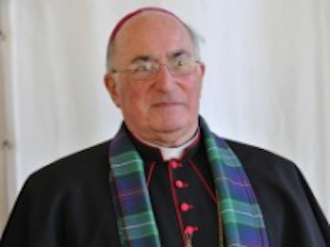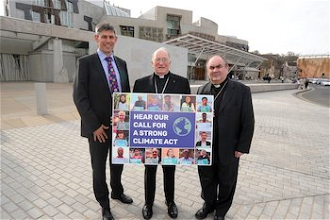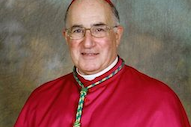Glasgow bids farewell to Archbishop Mario Conti

Archbishop Mario Conti
Source: SCMO
The funeral of Archbishop Mario Conti, the Archbishop Emeritus of Glasgow, took place at St Andrew's Cathedral in the city on Friday. In his homily, Bishop Hugh Gilbert, president of the Bishops' Conference of Scotland and the Bishop of Aberdeen, said Archbishop Conti would be remembered with "real affection and appreciation" as "a good and faithful servant" of the church.
The full text of Bishop Gilbert's homily is shown below.
"Remembering Mario, and his long, rich and fruitful life, it's hard not to smile. He had a certain manner, shall we say, a certain sense of the bella figura and his own dignity. As a boy at Blairs, it was well-known that he had no love for football but plenty for performing in Gilbert and Sullivan. In later years, Cardinal Winning, God forgive him, found the mannered, aesthetic side of Mario an irresistible target. But the more one knew Mario, the more one realised that, despite appearances, he would not have been finally or fully happy as a Renaissance Prince-Bishop or as a Prelate of the Ancien Regime. He had too much heart, too much humanity. The "boy from Barga" or, more strictly, the "Elgin loon", always came out on top. An Aberdeen parishioner told me how luridly Mario had been described to him, and how then, on a pilgrimage, he met this warm, humorous, approachable bishop who was just happy sitting on the grass and chatting with the folk for an hour and a half.
Here, I suppose, I must declare an interest. I first set eyes on Mario when I was 25 and very recently professed as a monk. I can still picture him. It was a February day of fearsome winter weather, and he was sitting by the fire in the Chapter House of Pluscarden Abbey, the early 40s parish priest of Wick and Thurso, bright-eyed and with a notable nose. A few days later the community we heard that he had been appointed Bishop of Aberdeen. Later, he would ordain me as a deacon, and as priest, bless me as abbot, and co-ordain me as bishop - all that over a span of 30 years. I think of him as sacramentally a father. And it was a grace to visit him, with others, on the day he died.
An addendum to his will, written twenty years ago, just after his coming here, reads: "I desire to proclaim my confidence in God's mercy, as I end my days - and to acknowledge the gift of his grace when called to priestly and episcopal service". In the light of that last phrase, and of today's Gospel (his choice), of his episcopal motto (drawn from the liturgy) sincero corde servire, "to serve with a sincere heart", it's natural for us today to recall something of that service. He was 64 years a priest and 45 years a bishop. In his Elgin Primary School, he famously declared his desire to become Pope. Well… His priesthood, and its fullness as bishop, was his life and his love, and they touched many lives over those many years. Ordained in 1958, his youthful ministry would have coincided with the pontificate of St John XXIII and then with the Second Vatican Council. The latter shaped him. He was always a man of the Council. After a spell at St Mary's Cathedral, Aberdeen, he was sent to Caithness, far to the north and a world of its own. Wick was already a church and a parish, but Thurso was not. He had the church and the presbytery built there. So, at St Anne's, Thurso, all those years ago, an interest began that culminates in this St Andrew's Cathedral so transfigured by his renovations. And today, coincidentally, is the memorial of St Fergus, patron of Wick. After 15 years in Caithness - too long he thought in one such place - he was nominated bishop. And the rest is history and part of the story of many of us here. For the dissertation for his Licence, he had written on Newman's On Consulting the Faithful in matters of Doctrine. Newman remained a luminary for him. He had his episcopal heroes, too: the Consul of God, Pope Gregory the Great, from whose feast he chose two of today's readings, and the gracious Savoyard, St Francis de Sales. "A Christian gentleman" was how an Aberdeen worthy once described Mario to me. One can only touch on some features of his episcopal years - almost 25 of them in Aberdeen and some 10 in post in Glasgow, a tale of two cities. It was an episcopal service, framed we could say, by the two papal visits to Scotland, St John Paul's in 1982 and Pope Benedict's in 2010. In his unique way, Mario traversed that particular epoch of Scottish Church history, perhaps yet to be defined and already different from where we are now. He enjoyed civic events, knew how to work a room and was a good dinner companion. I was always struck how consistently, in such settings, he confessed the faith. He would speak up for the Church and Christian tradition. He was never embarrassed at being Catholic. "As far as I am concerned, he said, we are part of Scottish society. The Catholic Church is not foreign to Scotland." He relished recalling Catholic history. After one of his lengthy sermons in an historic Moray church, a visiting prelate commented that "Mario has turned the pages of history for us, indeed leaving no page unturned." He will be remembered for his ecumenical sensibility and his wide and appreciated involvement in dialogue with other Christians and the workings of the various ecumenical bodies. In later years, he engaged, with no less commitment, in inter-faith relations. He supported the Catholic knightly orders (represented here). He could be a sharp and perceptive critic of the extravagances of secularism, the errors of government and social injustice. He was an eloquent advocate of a bioethics that respected the dignity of the human person, from conception to natural death and consistently upheld the Christian vision of marriage. On another front, he was always well-disposed to Religious orders and Congregations. To my own community, he was a stalwart friend and always a welcome visitor. He remembered picnicking as a boy with his parents and sister in the Priory grounds before the monks returned. His father prophesied that they would, and when in 1948 they did, the teenage Mario served at the official opening Mass. Undeterred by contemporary barbarians, he championed the cultural heritage of the Church, both in Scotland and more widely as part of a Pontifical Council for Culture. Indeed, the future of St Mary's Chapel, Blairs was a preoccupation of his last days. If in some domains, he didn't always hit the right note - or was it just the politically correct note he didn't hit? - there was never any doubt of his commitment. In the northeast, I can say from experience, he brought the Church down from the glens, as it were, and out of the back streets. He wasn't willing for it or its bishop to be consigned to the footnotes. The University of Aberdeen was the first to give him an honorary doctorate and he celebrated the first Catholic Mass since the Reformation in Bishop Elphinstone's University church. It said a lot that at the time of the Piper Alpha Disaster in 1988, it was he who led the mourning in Aberdeen. An obituary that described Mario as "effete" was seriously wide of the mark. He was perceptive, practical and firm, sustained by a sense of self and of mission.
I don't mean to weary you by recalling all this nor to degenerate into eulogy. I want to find the way, rather, to what was at the heart of this multi-faceted ministry. What held it together? It was the ideal of service, the service of the Lord and of his people. And it was the liturgical-sacramental-preaching role of the bishop which stood at the centre of this service and energised its every ramification. He was a natural celebrant. He must have confirmed a great number of young people over the years, celebrated many ordinations and performed the Eucharist in many varied settings. He liked to recall that. He cared for and about the liturgy. His first pastoral letters as bishop were a commentary on the order of Mass. He encouraged communion under both kinds. He introduced the permanent diaconate to Scotland. It was in his cathedrals and elsewhere that he could, in St Paul's words, "preach Christ Jesus as Lord" and "ourselves as his servants" and could, albeit an earthenware vessel, communicate the Treasure. How he will enjoy the Isaian banquet!
Remembering Mario, we remember a good and faithful servant, and pray that through the intercession of our Lady of Aberdeen, and of Ss Peter and Paul, and St Mungo, his judgment may be merciful. And we, the Catholic people of Scotland, as well as our friends of other denominations and religions and in civic society, have much to be grateful for. It is much more than a smile at some human foibles he leaves with us. It is real affection and appreciation. "Heart speaks to heart". He certainly speaks to mine, and I don't think I'm alone.
When he spoke at his own ordination as bishop in 1977, he quoted St Gregory the Great: "Son of man, I have appointed you as watchman for the house of Israel.' Now a watchman takes up his position on the heights so that he can see from a distance whatever approaches…Who am I? What kind of watchman am I? I do not stand on the pinnacle of achievement; I languish rather in the depths of my weakness. And yet the Creator and Redeemer of mankind can give me, unworthy though I be, the grace to see life whole and power to speak about it effectively. It is for love of him that I do not spare myself in preaching." He wrote those words out again in 2002 and in another note of 2016 called them "still dear to me".
Dear Mario, your preaching, celebrating and pastoring done, may you rest in peace and enter into the joy of your Lord. Amen."


















